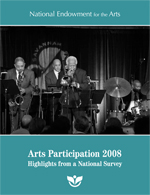CAA News Today
NEA Convenes with Arts-Organization Leaders to Discusses Recent Survey
posted by Christopher Howard — Dec 11, 2009
 Joan Shigekawa, senior deputy chairman of the National Endowment for the Arts (NEA), convened a roundtable discussion yesterday with national arts service organizations, regional arts organizations, and NEA staff to discuss the NEA’s 2008 Survey of Public Participation in the Arts, the nation’s largest and most representative study of adults’ arts participation habits.
Joan Shigekawa, senior deputy chairman of the National Endowment for the Arts (NEA), convened a roundtable discussion yesterday with national arts service organizations, regional arts organizations, and NEA staff to discuss the NEA’s 2008 Survey of Public Participation in the Arts, the nation’s largest and most representative study of adults’ arts participation habits.
Representatives from forty organizations participated, including Linda Downs, CAA executive director, as well as leaders from the Association of Art Museum Directors, Dance/USA, the Future of Music Coalition, the National Association of Latino Art and Culture, the National Center for Creativity in Aging, the National Network for Folk Arts in Education, and the New England Foundation for the Arts.
The convening began with a greeting from NEA chairman Rocco Landesman, followed by a summary presentation of the survey’s findings from Sunil Iyengar, NEA director of research. Representatives from three organizations offered formal responses—Helen De Michiel from the National Alliance for Media Arts and Culture, Carlton Turner from Alternate ROOTS, and Jesse Rosen from the League of American Orchestras—following which Shigekawa led a frank, freewheeling conversation about how these findings should inform the arts community’s work going forward, as well as how the survey should be expanded and refined in the future.
“It is important that the National Endowment for the Arts have regular conversation with the arts community about how the public participates in the arts, and what we can do to connect more Americans with more art, more often,” said Shigekawa. “Our research shows a strong connection between arts participation and civic participation, but art only works when the public participates. Today was a chance for the NEA staff to hear and learn from the service organizations that work with our country’s arts organizations, and we look forward to many more such opportunities.”
The 2008 Survey of Public Participation in the Arts, which was conducted in partnership with the US Census Bureau, asked more than 18,000 people 18 years of age and older about their frequency of arts engagement. CAA reported on the findings of the survey, which has been conducted five times since 1982, in June. Here are a few more statistics about American participation in the arts:
- Generation Y reports taking fewer arts classes and lessons. When people ages 18 to 24 were asked if they had taken an art class or lesson at some point in their lives, they reported lower rates of participation than previous generations for all art forms compared in this study (by 6 to 23 percentage points, depending on the art form, from 1982 to 2008)
- Arts participation correlates with higher civic participation. People who participate in the arts are two to three times as likely to engage in positive civic and individual activities—such as volunteering, attending sporting events, and participating in outdoor activities—than nonarts participants
- New England and Pacific region residents had some of the highest rates of attendance (42 percent of adults in each region) for the arts activities traditionally measured in the survey. In addition, the Plains states of Kansas and Nebraska have some of the highest participation rates for personal performance or creation of art nationwide. Twenty percent of adults in Kansas said they played a musical instrument. In Nebraska, that rate was nearly 18 percent. (Nationwide, 13 percent—or 29 million Americans—reported playing a musical instrument.)
A related research note on arts participation measured in regions and states will be released soon. The NEA will release additional topic-specific reports on the roles of age, race and ethnicity, arts learning, media use, and arts creation and performance. The survey, geographic research note, questionnaire, raw data, and user’s guide are available on the NEA website.


